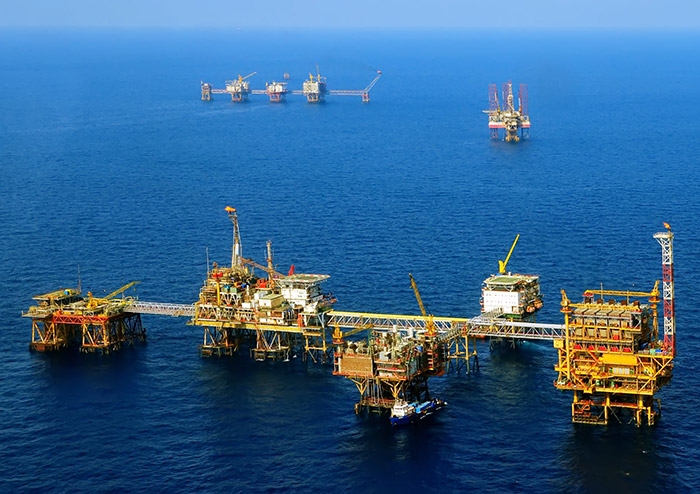Petroleum giant seeks further gains
 |
| PetroVietnam has seen strong growth throughout 2018, Photo: Dung Minh |
According to its latest report, state-run PetroVietnam maintained its business performance with sustained growth in October. Total production of oil equivalents reached 1.93 million tonnes last month, with a total of 20.1 million tonnes produced in the first 10 months, equalling 87.9 per cent of the yearly plan.
PetroVietnam’s oil production volume reached 1.15 million tonnes in October, a 7.2 per cent increase compared to the monthly plan, while the 10-month figure was 11.71 million tonnes, up 5.5 per cent compared to the plan for the period and 88.5 per cent of the full-year plan. Some 10.07 million tonnes of this were exploited domestically, while the remaining 1.64 million tonnes were exploited overseas.
Notably, in October, PetroVietnam exploited 0.78 billion cubic metres of gas, raising the total volume of gas exploited year-to-date to 8.39 billion cubic metres, up 4.1 per cent against the 10-month plan and completing 87.4 per cent of the yearly plan. Besides, fertiliser output reached 145,000 tonnes in October and 1.38 million tonnes year-to-date (up 7.2 per cent on-year, and hitting 89.6 per cent of full year target). Altogether, PetroVietnam reached 84.2 per cent of its full year petrol production plan with 7.46 million tonnes.
In general, the group surpassed financial targets by an average of 2-8.7 per cent in October, and 3.3-14.3 per cent during the 10 months.
Due to the increase in oil prices, PetroVietnam has outperformed its financial targets for October and the first 10 months of the year alike, setting itself on track for rosy full-year results. Its total revenue hit VND499.5 trillion ($21.7 billion), 21.1 per cent higher than the 10-month plan and up nearly 23.6 per cent against the same period last year. Besides, the group paid VND90.9 trillion ($3.95 billion) into the state budget in the given period, a 23.2 per cent increase compared to the annual target.
Furthermore, PetroVietnam’s subsidiaries also posted positive business results in the third quarter, including Binh Son Refining and Petrochemical JSC (BSR), Petrovietnam Drilling and Well Services Corporation (PV Drilling), Petrovietnam Technical Services Corporation (PVS), and PetroVietnam Power Corporation (PV Power), among others. One outstanding event in October was the resumption of the Dung Quat bio-fuel plant after three year of suspended operations. Only five days after restarting operations, the plant rolled out the first batch of E100 products.
Moving forward, PetroVietnam has suggested the government to amend the Law on Petroleum to stimulate exploration and production activities, thereby promoting the development of the oil and gas industry. Revisions to the law should be in line with the recently approved marine economic development strategy for 2030 with vision to 2045. The resolution sets six priorities for the development of the maritime sector, with the exploitation of oil and gas ranking as the third-highest priority and the oil refinery industry the fifth.
Moreover, Vietnam’s crude oil output is expected to fall by 10 per cent (or two million tonnes) a year through to 2025 due to declining reserves at existing fields. This, coupled with a lack of funds, kept PetroVietnam from boosting exploration activities. The rise in recoverable reserves has slowed to an alarming rate, affecting the sustainability of the development of the oil and gas industry.
PetroVietnam general director Nguyen Vu Truong Son said PetroVietnam’s oil output was 25 million tonnes in 2017, but exploration had only yielded four million tonnes of oil. If the imbalance between exploration and exploitation increases, the industry will only be able to sustain its petroleum output for a few more years before it will drop by roughly two thirds.
To facilitate the development of the group, Son said there should be revisions to the Law on Petroleum to stimulate foreign investment, exploration, and production at existing fields, as well as investment in the development of offshore discoveries.
What the stars mean:
★ Poor ★ ★ Promising ★★★ Good ★★★★ Very good ★★★★★ Exceptional
 Tag:
Tag:
Related Contents
Latest News
More News
- Masan Consumer names new deputy CEO to drive foods and beverages growth (February 23, 2026 | 20:52)
- Myriad risks ahead, but ones Vietnam can confront (February 20, 2026 | 15:02)
- Vietnam making the leap into AI and semiconductors (February 20, 2026 | 09:37)
- Funding must be activated for semiconductor success (February 20, 2026 | 09:20)
- Resilience as new benchmark for smarter infrastructure (February 19, 2026 | 20:35)
- A golden time to shine within ASEAN (February 19, 2026 | 20:22)
- Vietnam’s pivotal year for advancing sustainability (February 19, 2026 | 08:44)
- Strengthening the core role of industry and trade (February 19, 2026 | 08:35)
- Future orientations for healthcare improvements (February 19, 2026 | 08:29)
- Infrastructure orientations suitable for a new chapter (February 19, 2026 | 08:15)





















 Mobile Version
Mobile Version